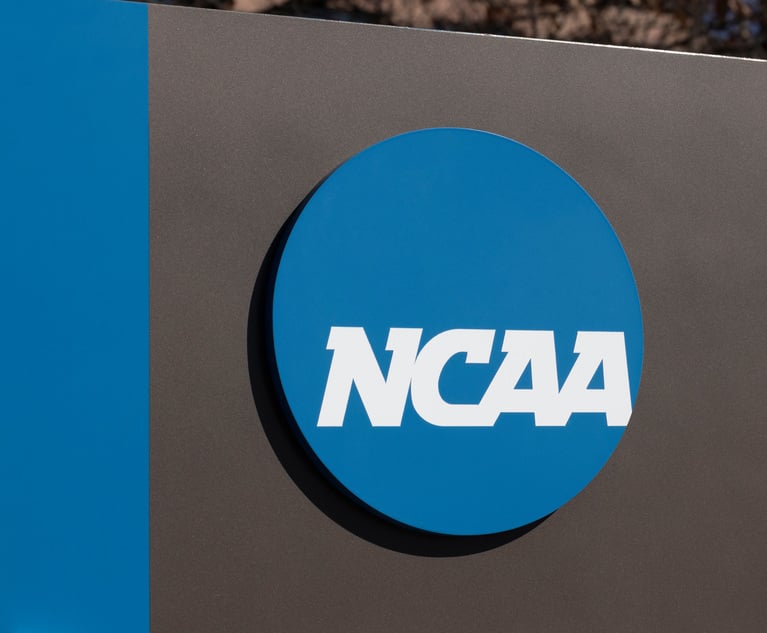 U.S. Department of Justice. Photo: Diego M. Radzinschi/ALM
U.S. Department of Justice. Photo: Diego M. Radzinschi/ALMNew Jersey, Pennsylvania Join Fight Against OLC Memo on State Lotteries
Pennsylvania and New Jersey argue that the 2018 decision represents an about-face from another decision by the OLC in 2011, which said the Wire Act applies only to the use of the wires for sports-related gambling. The states said they relied on the 2011 decision in making significant investments in online lottery and gaming offerings.
March 05, 2020 at 06:29 PM
5 minute read
New Jersey and Pennsylvania are opposing a new Justice Department legal memo that would expose state lottery systems to criminal prosecution.
In amicus briefs filed Wednesday, the states said their lottery and online gambling programs could face shutdown under a 2018 memo issued by the DOJ's Office of Legal Counsel reinterpreting the Wire Act. The states expressed support for the New Hampshire Lottery Commission and a group of lottery vendors, who are asking the U.S. Court of Appeals for the First Circuit to uphold a 2019 decision setting aside that OLC memo.
Pennsylvania and New Jersey argue that the 2018 decision represents an about-face from the government's stance under the Obama administration in 2011, when it said the Wire Act applies only to the use of the wires for sports-related gambling. The states said they relied on that 2011 decision in making significant investments in online lottery and gaming offerings.
"The DOJ's reinterpretation of the Wire Act should be rejected not only because its statutory arguments are flawed, but also because its change of position ignores the harms that would result from reasonable actions taken by the states in reliance on DOJ's 2011 opinion," the New Jersey brief said.
At issue in the case is the weight and significance of OLC memos, which provide regulatory and enforcement guidance to the executive branch. Main Justice told the appeals court that its internal legal opinions are not final agency actions and have no force of law.
"OLC opinions are not final agency action reviewable under the [Administrative Procedure Act] because they are predecisional legal advice and do not themselves determine rights or obligations or impose any legal consequences," the DOJ said.
The power of OLC memos has been a hot topic as of late, with their force and validity coming up in the Mueller probe and President Donald Trump's impeachment proceedings. Opinions from the Office of Legal Counsel have attracted widespread attention in the Trump administration, as Justice Department officials have issued memos arguing why certain high-level officials cannot speak with House Democrats, and also why the president's tax returns cannot be released to congressional investigators.
The Justice Department's policy against indicting a sitting president was established by an OLC memo, an opinion cited by special counsel Robert Mueller III in his report on Russia's interference in the 2016 presidential election and Trump's alleged obstruction of the investigation. No federal judge has ruled on that OLC policy, but it has been questioned in court.
Litigation involving OLC memos is rare. The federal judge in New Hampshire who set aside the OLC memo called it a "mistaken" opinion "that no additional process can cure," sparking the Justice Department's appeal.
Other amicus briefs were filed Wednesday by the Association of Gaming Equipment Manufacturers and International Game Technology, a lottery services company, urging the the appeals court to strike the 2018 memo.
Greenberg Traurig filed Pennsylvania's brief, while New Jersey's was filed by in-house lawyers for the state. Covington & Burling is counsel for the Association of Gaming Equipment Manufacturers, and Sidley Austin represents International Game Technology.
Pennsylvania's brief notes that the DOJ "has refused to renounce" the 2018 opinion. A broad interpretation of the opinion could result in the suspension of most, if not all, state lottery sales, and the loss of over $1 billion in annual proceeds to Pennsylvania, which uses such revenue in programs to benefit older residents.
A less expansive reading of the 2018 opinion could lead to the shutdown of Pennsylvania's iLottery program, which allows the purchase of lottery tickets online, the state's brief said. The lottery relied on the 2011 opinion when it incurred $3.1 million in costs to develop the online platform, and that program is expected to yield nearly $40 million in proceeds this year, the state's brief said.
New Jersey's brief cited several Supreme Court cases holding that an agency's statutory interpretation must be rejected under the Administrative Procedures Act if it reverses a prior interpretation by the same agency without adequately accounting for reasonable reliance interests that have accrued in the interim.
New Jersey expressed concern that the 2018 memo has the potential to end its internet gaming industry, which allows participants to make online wagers on poker, roulette and craps games played in Atlantic City casinos. Since its inception in 2013, internet gaming in New Jersey has created more than 3,300 jobs. It produced $124 million in tax revenue for state and local governments from 2013 to 2016, the state's brief said.
"There is every reason to believe that the DOJ will attempt to prosecute those involved in such transactions in light of the 2018 reinterpretation. And that threat alone, regardless of the merit of such a prosecution, will devastate New Jersey's iGaming industry," New Jersey's brief said.
This content has been archived. It is available through our partners, LexisNexis® and Bloomberg Law.
To view this content, please continue to their sites.
Not a Lexis Subscriber?
Subscribe Now
Not a Bloomberg Law Subscriber?
Subscribe Now
NOT FOR REPRINT
© 2024 ALM Global, LLC, All Rights Reserved. Request academic re-use from www.copyright.com. All other uses, submit a request to [email protected]. For more information visit Asset & Logo Licensing.
You Might Like
View All
Sports Attorney Rejoins Jets for Second Tour of Duty as GC


Judge Extinguishes Suit Seeking Ban on Smoking in Atlantic City Casinos
5 minute read
Third Circuit Ruling Saying College Athletes Can Be Employees Leaves 'Lots of Open Questions'
Law Firms Mentioned
Trending Stories
Who Got The Work
Dechert partners Andrew J. Levander, Angela M. Liu and Neil A. Steiner have stepped in to defend Arbor Realty Trust and certain executives in a pending securities class action. The complaint, filed July 31 in New York Eastern District Court by Levi & Korsinsky, contends that the defendants concealed a 'toxic' mobile home portfolio, vastly overstated collateral in regards to the company's loans and failed to disclose an investigation of the company by the FBI. The case, assigned to U.S. District Judge Pamela K. Chen, is 1:24-cv-05347, Martin v. Arbor Realty Trust, Inc. et al.
Who Got The Work
Arthur G. Jakoby, Ryan Feeney and Maxim M.L. Nowak from Herrick Feinstein have stepped in to defend Charles Dilluvio and Seacor Capital in a pending securities lawsuit. The complaint, filed Sept. 30 in New York Southern District Court by the Securities and Exchange Commission, accuses the defendants of using consulting agreements, attorney opinion letters and other mechanisms to skirt regulations limiting stock sales by affiliate companies and allowing the defendants to unlawfully profit from sales of Enzolytics stock. The case, assigned to U.S. District Judge Andrew L. Carter Jr., is 1:24-cv-07362, Securities and Exchange Commission v. Zhabilov et al.
Who Got The Work
Clark Hill members Vincent Roskovensky and Kevin B. Watson have entered appearances for Architectural Steel and Associated Products in a pending environmental lawsuit. The complaint, filed Aug. 27 in Pennsylvania Eastern District Court by Brodsky & Smith on behalf of Hung Trinh, accuses the defendant of discharging polluted stormwater from its steel facility without a permit in violation of the Clean Water Act. The case, assigned to U.S. District Judge Gerald J. Pappert, is 2:24-cv-04490, Trinh v. Architectural Steel And Associated Products, Inc.
Who Got The Work
Michael R. Yellin of Cole Schotz has entered an appearance for S2 d/b/a the Shoe Surgeon, Dominic Chambrone a/k/a Dominic Ciambrone and other defendants in a pending trademark infringement lawsuit. The case, filed July 15 in New York Southern District Court by DLA Piper on behalf of Nike, seeks to enjoin Ciambrone and the other defendants in their attempts to build an 'entire multifaceted' retail empire through their unauthorized use of Nike’s trademark rights. The case, assigned to U.S. District Judge Naomi Reice Buchwald, is 1:24-cv-05307, Nike Inc. v. S2, Inc. et al.
Who Got The Work
Sullivan & Cromwell partner Adam S. Paris has entered an appearance for Orthofix Medical in a pending securities class action arising from a proposed acquisition of SeaSpine by Orthofix. The suit, filed Sept. 6 in California Southern District Court, by Girard Sharp and the Hall Firm, contends that the offering materials and related oral communications contained untrue statements of material fact. According to the complaint, the defendants made a series of misrepresentations about Orthofix’s disclosure controls and internal controls over financial reporting and ethical compliance. The case, assigned to U.S. District Judge Linda Lopez, is 3:24-cv-01593, O'Hara v. Orthofix Medical Inc. et al.
Featured Firms
Law Offices of Gary Martin Hays & Associates, P.C.
(470) 294-1674
Law Offices of Mark E. Salomone
(857) 444-6468
Smith & Hassler
(713) 739-1250






